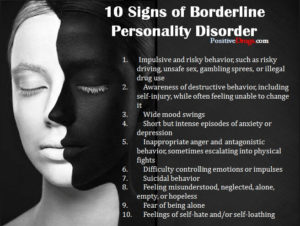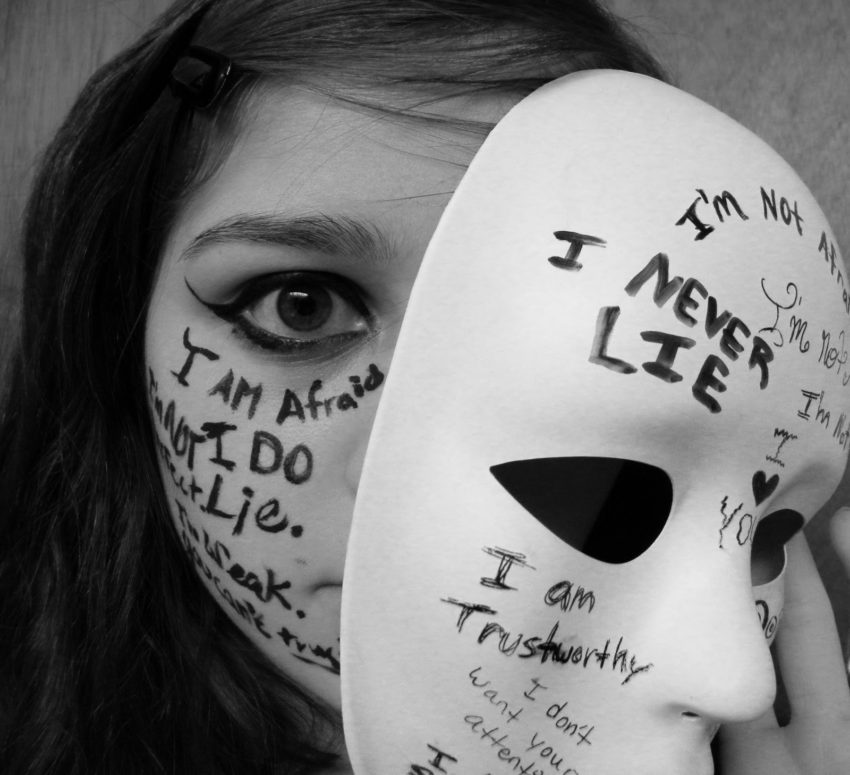Borderline Personality Traits in Women
Since I recently wrote a post titled “Do I have a mental disorder” I felt like continuing the theme. And don’t worry, I promise I’ll research and write on men and women both. As I received some comments on the mental disorder post I realized something. I know that mental disorder is kind of one of those topics that many people don’t like to discuss. Certainly many people feel there is a stigma of sorts attached to it. The reality is mental health is just as important as physical health. When my body isn’t functioning the way it should I go to the medical doctor. There’s no reason why I wouldn’t go the to the mental doctor if my brain isn’t functioning the way it should. Or I want it to. With that let’s dive right into borderline personality traits in women.
What is Borderline Personality Disorder
 Here is the definition of borderline personality disorder as defined by the National Institute of Mental Health (NIH). “Borderline personality disorder is a mental illness marked by an ongoing pattern of varying moods, self-image, and behavior. These symptoms often result in impulsive actions and problems in relationships. People with borderline personality disorder may may experience intense episodes of anger, depression, and anxiety that can last from a few hours to days.”
Here is the definition of borderline personality disorder as defined by the National Institute of Mental Health (NIH). “Borderline personality disorder is a mental illness marked by an ongoing pattern of varying moods, self-image, and behavior. These symptoms often result in impulsive actions and problems in relationships. People with borderline personality disorder may may experience intense episodes of anger, depression, and anxiety that can last from a few hours to days.”
Borderline personality disorder, or BPD for short, is considered a common mental illness. It affects more than 3 million people in the US.
Signs and Symptoms of Borderline Personality Disorder
Here are some of the signs and symptoms of BPD. These are considered universal across men and women. Soon I will discuss the how borderline personality traits in women is viewed. And why it may seem to be different than men.
An intense fear of abandonment. This includes going to extreme measures to avoid real or imagined separation.
Suicidal threats or behavior or self-harm. These are often in response to the fear of potential rejection, abandonment, or separation.
Inappropriate or intense anger on a regular basis. This can be seen in frequent outbursts or fighting, most of the time verbal but sometimes physical. Also characterized by extreme sarcasm or bitterness.
Wide mood swings. These can happen within a few hours or over a period of days. For example, if I was super happy in the morning then dark and down in the afternoon that happens sometimes. On the other hand, if that’s how I am every other day, that’s a sign.
Impulsive or risky behavior. Many of us enjoy doing things that make us feel alive from time to time. Sky diving, last minute trips to Vegas, etc. This is different. When you see a pattern of things such as unsafe sex or reckless driving, that’s an indicator. Or if I was always gambling away money I didn’t have. Binge eating and drug abuse aren’t uncommon either.
Further Signs and Symptoms of Borderline Personality Disorder
A pattern of unstable intense relationships. If the entirety of someone’s relationship history is short and tumultuous, this could be an indicator. For instance if I swung between idolizing the person I was with to not being to stand them, that’s not good. Especially if I did this on a regular basis.
Rapid changes in self-image and self-identity. This can be a shifting of values and goals as well as feelings of self worth. I think I’m awesome to I think I’m horrible in short time frames. Especially with no input to make me think or feel this way.
Going through periods of stress related paranoia and loss of contact with reality. This is fairly rapid shifting. Can be from several minutes to several hours.
Ongoing feelings of emptiness. Probably don’t need to add much to this.
Borderline Personality Traits in Women
I’ve been around enough guys over the course of my life who have difficulty dealing with their girlfriend or wife. They seem to take it step  past the whole “Men are from Mars, Women are from Venus” concept. They take it to the level of thinking she is BPD because they don’t get or can’t handle different moods. This is where some of the roots have grown that BPD is more of woman’s mental illness. As a matter of fact, at one point it was thought that women outnumbered men 3:1 in getting diagnosed with BPD. As you see in this recent article titled “Does Borderline Personality Disorder Affect Women More Than Men” published this year by Everyday health that’s simply not true.
past the whole “Men are from Mars, Women are from Venus” concept. They take it to the level of thinking she is BPD because they don’t get or can’t handle different moods. This is where some of the roots have grown that BPD is more of woman’s mental illness. As a matter of fact, at one point it was thought that women outnumbered men 3:1 in getting diagnosed with BPD. As you see in this recent article titled “Does Borderline Personality Disorder Affect Women More Than Men” published this year by Everyday health that’s simply not true.
One of the reasons why it was thought that more women suffered from BPD than men was clinical settings. Basically more women than men seek help for BPD. Pretty typical women vs. men behavior in general when it comes to health issues. Another reason is that women are more likely to have an ongoing mood disorder such as depression. Men may also suffer from antisocial personality disorder along with BPD. They are more likely to wind up in a correctional facility instead of a doctors’ office.
Overall there are more similarities than differences between men and women in the area of borderline personality disorder. Therefore, borderline personality traits in women is very similar to what’s seen in men.
Do I Have BPD?
If you have read this article and thought to yourself “this sounds familiar” here are some things to consider.
To be diagnosed with BPD you need to identify with 2 of the following characteristics:
- Trouble empathizing
- Low self-esteem
- Avoiding thinking about the future
- Chaotic relationships
You also know to exhibit 4 of the following symptoms, with at least one being uncontrollable anger, being impulsive, or ongoing risk taking.
- Fear of abandonment

- Depression
- Frequent mood swings
- Risk taking
- Impulsivity
- Overwhelming anxiety
- Uncontrollable anger
If you think you may relate to some of these but you aren’t sure, best to go see a doctor.
Resources
Know that borderline personality can be treated. The borderline personality traits in women are very similar to what’s seen in men. If you suspect you may suffer from BPD, go see a doctor to discuss. Here are some resources that can further educate you on the subject.
Borderline Personality Disorder Toolbox: A Practical Evidence-Based Guide To Regulating Intense Emotions – by Jeff Riggenbach
This is Not The End: Conversations On Borderline Personality Disorder – by Tabitha Martin and Paula Tusiani-Eng
I Hate You – Don’t Leave Me: Understanding the Borderline Disorder – by Jerold J. Kreisman and Hal Straus
Borderline Personality Disorder For Dummies – by Charles H. Elliott and Laura L. Smith
Conclusion
Borderline personality traits in women are very similar to traits seen in men. There has been an ongoing myth that women suffer from BPD more than men. When looking at the studies and mounting evidence, this is not true. Women seek help more often is one big reason for the myth. Another is men tend to show antisocial behavior which lands them in jail instead of a doctors office.
Borderline personality disorder is treatable. Remember that mental health is equally important as physical health. If you suspect you may suffer from bipolar personality disorder, go see a physician.
In good mental health,
Mat A.


Very interesting post, also because I know somebody who has Borderline.
You know that many people disrespect it, and think they’re making it up, including doctors.
This is very bad, since they are trapped within themselves, and they need that push to break through, and develop a character which really suits them.
This person still have Borderline, but luckily, his doctor approves he has it, so that is a good start.
I will share this post so people know what it is.
Thanks for sharing!
Emmanuel,
Thanks for the stopping by and sharing your thoughts. The important thing that too many people seem to turn a blind eye to is that there is help out there. No need to suffer when there are resources to assist. Thanks again!
My wife and I have been going through a few problems at the moment and we are both blaming each other (as you do) but I seriously thought she has mental health problems as she hasn’t been the same since giving birth to our son 6 months ago.
I came online to see if there was anything that could help us but so far I have found nothing that describes what she is going through, until I stumbled on this post.
She has quite a few of the traits that you show here like depression, Anxiety, anger issues, fear of abandonment, and a couple of others but not all of them.
After reading this really informative post I don’t believe she has BPD but there is certainly something wrong and she will not go to see a doctor about it, do you have any ideas what she could be going through? I really would appreciate your help and I will show her your reply to see if it will help, thanks
Matthew,
Thank you for sharing your personal story. You said she gave birth to your son 6 months ago. Postpartum depression is a very real thing and not uncommon. My suggestion would be to ask her if she’d be interested in speaking to someone about it. I know how hard that can be.
Most of my social circle consists of creatives – writers, poets, comedians – and probably more than the average have mental health issues. Most are not of the suicidal or self-harming type and the community is very supportive but I have lost to friends to suicide over the past two years. One had serious depression (which was being treated and we thought under control) but the other was as bright and breezy as you can imagine. I didn’t know this person terribly well but going through your checklist I can now see that they ticket some of the boxes, particularly in the relationship department.To be honest, I never thought of their behaviour as potentially dangerous.
I know people can be very sensitive about discussing such matters so if you think someone is exhibiting some of the signs you mention, how would you suggest going about approaching the subject with them?
Some people are very open about their mental health difficulties but many people, if you ask them how they are, they just say ‘fine’.
Ian
Hi Ian,
Thank you for your comments. I know from personal experience it’s very difficult to approach the subject of depression with someone. In my experience I’ve found the best option is to let the know you are there for them.
Hi Mat
This was an interesting read and I’m glad I’ve read this as I wasn’t aware of BPD before. I think it’s great to be able to discuss anything related to mental health issues as it is such a hot topic nowadays, even if there is some stigma attached to it, especially within certain cultures.
I agree with you when you say our mental health is equally as important as our physical health, we just need to overcome that barrier or stigma associated with it. I think it’s also interesting to know that the symptoms are the same for both men and women and that it doesn’t just largely affect women. You mentioned at the end of the post about bipolar personality disorder – is this the same as BPD?
Thanks
Teresa
Hi Teresa,
Thanks for stopping by. As a society we’ve created this stigma that it’s not okay to ask for mental help. It’s too bad. In my opinion mental health is literally as important as physical health.
To answer your question – Bipolar personality disorder is different than borderline personality disorder.
Yeah this is a very great topic borderline personality disorder for a start of course I am a man but needless that I am, matter fact is believe it goes both ways whether you a man or a woman yes feelings like frequent mood swings, trouble emphasizing, low self esteem. avoiding thinking about the future, chaotic relationships, fear of abandonment, depression, risk taking, overwhelming anxiety, uncontrollable anger we can go on and on but these are the signs BPD is around you.
Ladies & gentlemen is all about timing and miss opportunity when the defense is broken at this stage it becomes like a loose cannon oh yeah like an accident waiting to happen or a time bomb waiting to explode well before it comes to these finishing line go see the doctor before is really late. On this note all the best to all of us in good will hunting,
Thanks for the note Otis, appreciate you sharing.